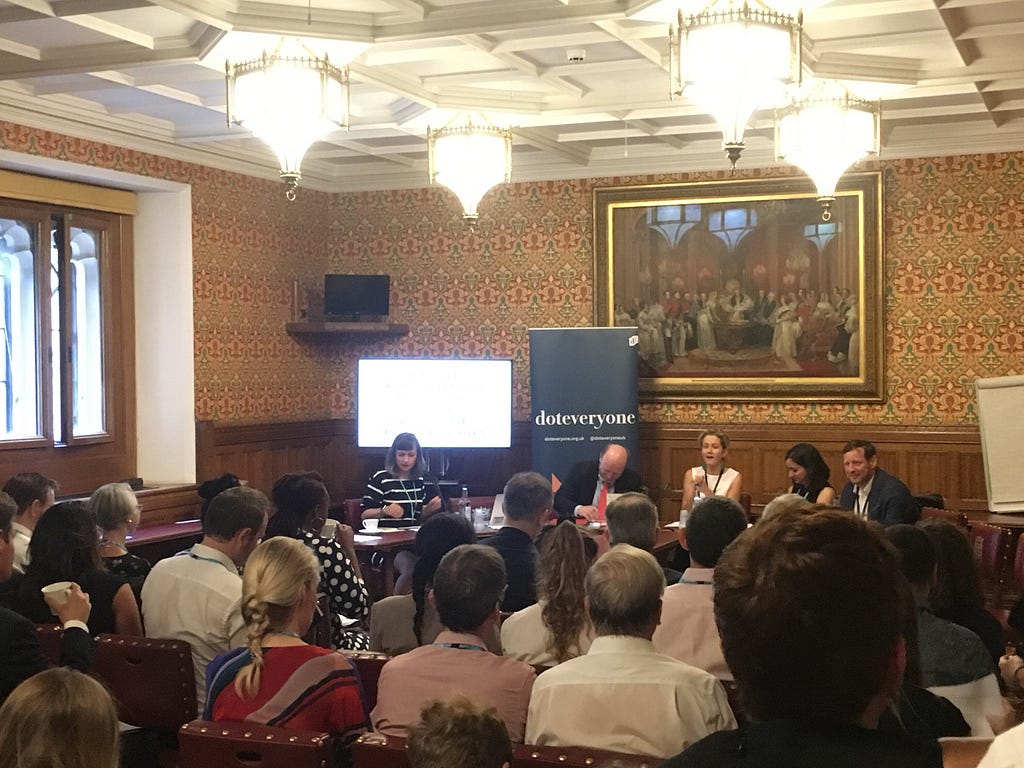Tech regulation is broken and the time to act was yesterday

There were calls today from business and leading politicians for urgent reform to regulate technology.
At a standing room only Westminster briefing on Doteveryone’s green paper, Regulating for Responsible Technology, political leaders, activists and technologists criticised the ongoing failure of government and the technology sector to create effective regulation.
Doteveryone CEO Rachel Coldicutt opened the briefing by describing the emerging challenges presented by the pace of change in the tech industry, noting how new technologies such as facial recognition and microtargetted social media messaging had changed the landscape of the debate in a short time.
She suggested a new regulatory system that would be flexible and resilient to technological change was required, but warned its success would depend on regulatory bodies becoming an attractive option for bright thinkers and technologists.
Speaking on a panel chaired by Doteveryone founder Martha Lane Fox, Shadow Digital Minister Liam Byrne MP said, “This current system is completely broken; we’re going to need a different regulatory structure for the years to come.”
“If you have an industry that is jeopardising the integrity of our democracy and the integrity of our marketplace there’s a pretty compelling case for change,” he added, referring to alleged Russian interference in the EU referendum campaign via targeted online content, and the upheavals to employment due to automation and artificial intelligence.
Former Digital Minister Ed Vaizey agreed that the current system has not kept pace and that the tech industry has to accept the need for regulation.
Regulating for Responsible Technology: Making the case for an Independent Internet Regulator
“Technology is in the public square and it’s the job of politicians and citizens to interpret the role of tech in that public square. Everyone should have a say in how that role is carried out because of the huge impact it has on our lives.”
Kriti Sharma, V-P for AI at Sage said there was a failure even to apply existing legislation to the impacts of technology, for example in the ways in which algorithms can be discriminatory.
“The need to act was yesterday. We need to apply the rules and regulations that already exist to algorithms in the same way we do to humans,” she said.
Shambles
Liam Byrne described the current regulatory system as a ‘shambles’.
“Ofcom regulates moving pictures but not online where most young people watch, the Advertising Standards Authority doesn’t regulate political content, the Electoral Commission doesn’t have the power to investigate things like the sources of money,” he said, describing the regulators’ fragmented response to allegations of malpractice in the EU referendum campaign.
But he said when he tried to bring these regulators and the Information Commissioner’s Office together to discuss reforming the system, they all refused, convincing him of the need for a complete overhaul.
Comparing the current technological change to the Industrial Revolution he anticipated a period of 50–60 years of regulating and re-regulating to respond to the societal impacts of technologies, saying these must be underpinned by a Digital Bill of Rights.
He described Doteveryone’s report as a seminal piece of work which would help to crystallise the consensus for regulatory reform.
Ed Vaizey, who served as digital minister from 2010 to 2016, agreed that ‘analogue’ systems of regulation were ineffective in responding to new technologies.
“It’s a red herring to ask if Facebook is a publisher, it’s something phenomenal and new. It’s neither a publisher or platform and it merits a new form of regulation — but it does merit regulation,” he said.
Collaboration
However, he stressed that regulation will be most effective if it is collaborative.
“The internet has been a success because it’s always been a multi-stakeholder model, it hasn’t been top down regulation,” he said.
“It’s been a partnership between government, business and civic society and that’s an approach we should try and keep and treasure”.
Kriti Sharma agreed business was willing to work together with regulators.
“Responsible technology is no longer a nice thing to do to look good, it’s becoming a fundamental pillar of corporate business models,” she said.
“In a post-Cambridge Analytica world, consumers are demanding better technology and more transparency. Companies that do create those services are the ones that will have a better, brighter future.”
Warning that relentlessly negative stories about the impacts of technology had the potential to be damaging and hinder the use of technology to solve social challenges, she sees the establishment of the new Centre for Data Ethics and Innovation as an opening for business to support collaborative regulation.
“We have the opportunity to shape that organisation and work closely and collaboratively with them. We should not be scared of regulators but be proactive and understand and share what best practices are. We have the opportunity to be on the right side of history and be co-creating rather than having friction.”
Further consultation
The relationship between technology companies, government and society is at a pivotal point and Doteveryone is seizing this opportunity to explore how regulation can shape it for the better.
In May 2018 we spoke to technologists, ethicists, regulators, legal specialists, civil society and policymakers to understand the current landscape of internet regulation in the UK. Our Green Paper Regulating for Responsible Technology: Making the case for an Independent Internet Regulator brings together these discussions and calls for a new regulatory approach to ensure digital technologies work for the good of society.
We will publish a White Paper with proposals for a new regulatory system later in the year. We will feed the contributions from panelists and audience members at the event into the development of this work and continue to welcome external input. Please get in touch to share your ideas [email protected]
Tech regulation is broken and the time to act was yesterday was originally published in Doteveryone on Medium, where people are continuing the conversation by highlighting and responding to this story.